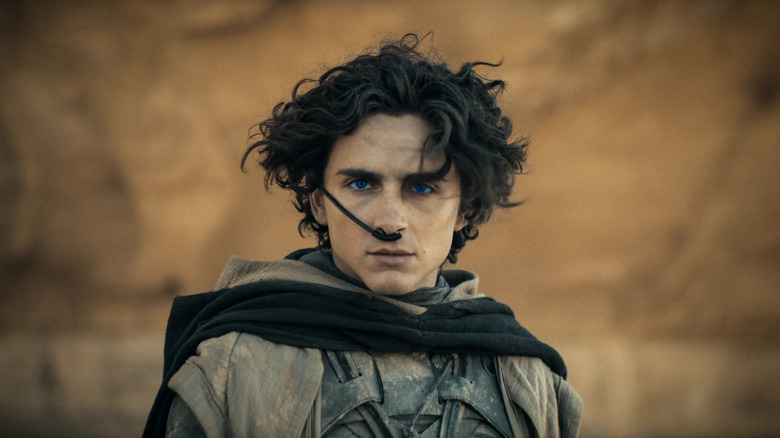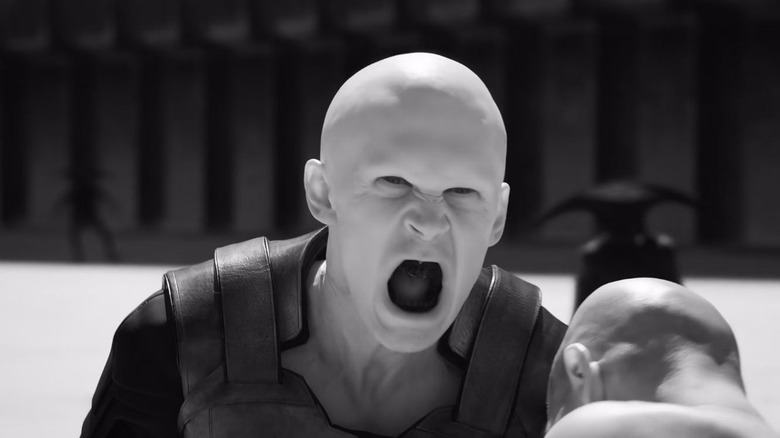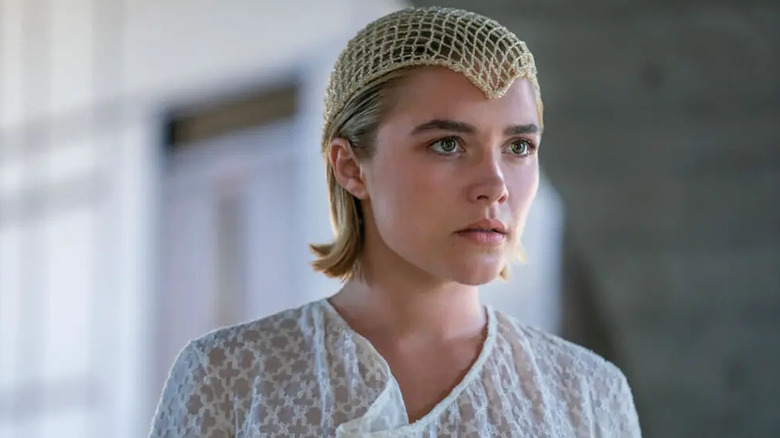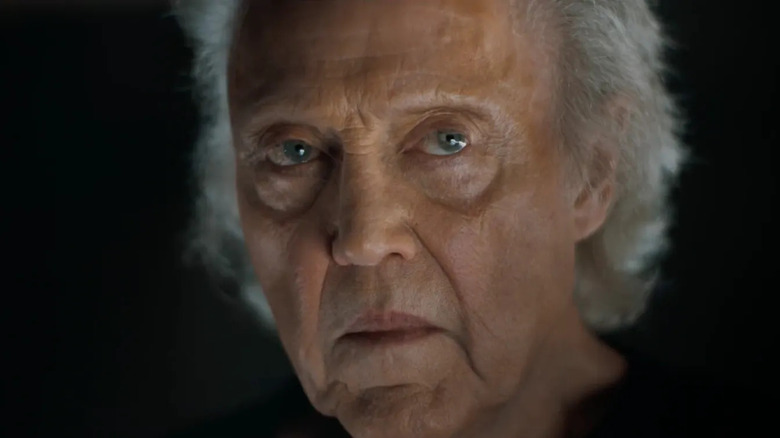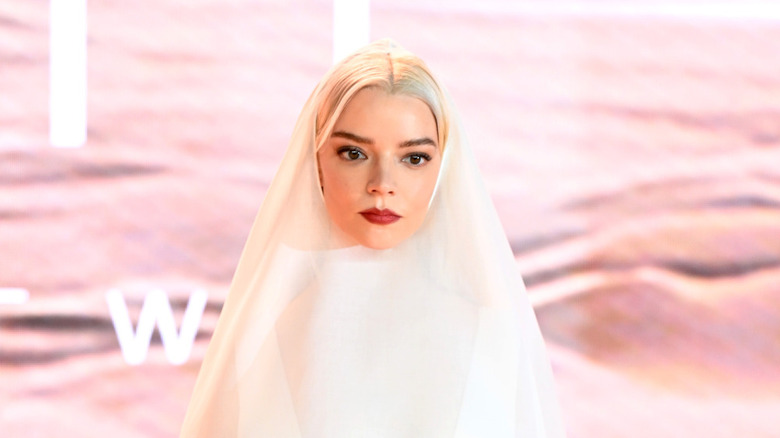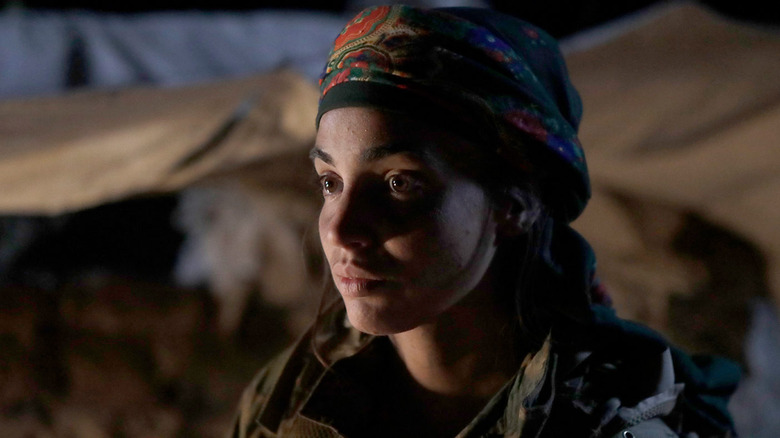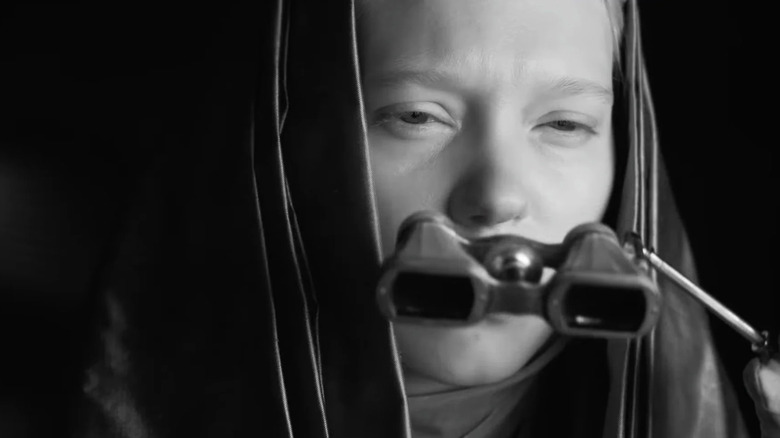Dune: Part Two Cast & Character Guide
Spoilers for "Dune" and "Dune: Part Two" follow.
When audiences first learned that "Dune" would be split in two, there were quite a few skeptical reactions. The 2010s, after all, were filled with multi-part adaptations of books that arguably weren't long enough to require more than one movie. Even with "Harry Potter and the Deathly Hallows," a 750-page book that certainly made good use of that extra breathing room, the production still got plenty of flak for splitting it up. "Final Minutes Of Last Harry Potter Movie To Be Split Into Seven Separate Films," The Onion joked at the time, mocking the series for dragging out the story for money, as well as mocking the fans for being so okay with it.
Although it was probably unfair to make fun of "Harry Potter" specifically for this choice, the criticism in general did feel increasingly prescient as "The Hunger Games" and "The Hobbit" pulled similar, far-less-sympathetic stunts. If the 400-page "Fellowship of the Ring" was capable of being adapted into a single movie, audiences wondered in 2014, then why did the 250-page "The Hobbit" need three?
Luckily, "Dune: Part Two" (read our review here) has largely beaten the cash-grab allegations. Part of that's just because of how good it is, but part of it's thanks to how it truly feels like its own separate thing. "Dune: Part Two" doesn't just have a different tone and focus than the first movie, but it involves the addition of multiple new members of the cast. Characters like Paul, Jessica, Chani, Stilgar, and Gurney Halleck are still around, of course, but this time they're joined by a handful of fascinating, game-changing new players.
Austin Butler as Feyd-Rautha Harkonnen
Feyd-Rautha is a scary dude. He's described as "psychotic" early on and he happily lives up to that promise. He's weird, creepy, and a fierce fighter, which makes things all the more stressful since Paul can't reach the throne without getting past him first. Paul won with barely any effort the last time he had to duel with someone; this time it won't be so easy. Making Feyd-Rautha even more interesting is his strange sense of honor; he's evil, sure, but he respects the few people who can hold their own with him.
Austin Butler's performance in "Part Two" is fascinating, even outdoing Sting's memorable portrayal in the 1984 movie. Returning cast member Dave Bautista explained in an interview last year, "I don't know who this guy was, but it's not Austin Butler. It's not Elvis ... His voice is different, his look is different. Everything about his demeanor is terrifying." Now we know for sure that Bautista wasn't kidding. It's bad news for Bautista's character, Beast Rabban, who will now have to find a way to work together with this lunatic.
Florence Pugh as Princess Irulan
The book version of Irulan is, technically speaking, the first character we ever meet in the series. Every chapter of "Dune" begins with an excerpt from the "Manual of Muad'Dib," an in-universe book that would later be written about Paul after his reign. She is the Emperor's daughter, but despite the Emperor's treachery towards the Atreides characters in the first movie, she is no villain.
Despite how wise and cool she sounds at first, the version of Princess Irulan in the books doesn't have a whole lot to do. Her role is surprisingly thankless; it's part of an intentional subversive long-term character journey, sure, but it's disappointing nonetheless to readers who let all those early excerpts hype her up in their heads.
Florence Pugh's Irulan, meanwhile, is allowed a bit more agency. Her story goes down the same basic route, but she's given more focus and more dignity from the narrative throughout the film. We meet her early on and are shown much more of her life outside of Paul's perspective, letting her intelligence be displayed rather than largely spoken of as it is in the novel. Still, as Pugh explained in a recent interview about the character, "Dune: Part Two" definitely leaves us wanting more:
"She's allowed to grow, which is a wonderful thing ... She becomes more of an essence so I appreciated how she wasn't just fully present how you want to know more about her."
Christopher Walken as Emperor Shaddam IV
Look, it's tough being the Emperor of the Known Universe, and nobody knows it more than this guy. The Padishah Emperor of the books is old and stressed out, and it's his insecurity around the popularity of Paul's father that starts off the whole series. He essentially exiles the Atreides house to the desert planet of Arrakis, then has the Harkonnen kill them shortly after they get there. Why not just kill them directly? Because the Atreides are a little too well-liked and established for such a feat to go down smoothly. His betrayal of House Atreides would have to be done secondhand so that the Emperor could maintain some plausible deniability.
Like his character in the book, movie Emperor Shaddam has a lot of complicated, mostly negative feelings towards the House of Atreides. "Your father was a weak man," he says to Paul in the trailer, although all that bravado is undermined by the Emperor's clear frustration with Paul's continued existence. If Paul and Jessica had died as he planned in Part One, all the Emperor's problems would be over. Instead, he and his daughter have all sorts of new headaches to navigate.
Anya Taylor-Joy as Alia
Anya Taylor-Joy is easily the most surprising addition to the cast, given that book Alia is a child throughout the entirety of the first book. There, Jessica gives birth to her with a few hundred pages left in the story to go; the young Alia looks like a small child, but she freaks everyone out by showing a clear intelligence and maturity of someone far beyond her age. This is all due to Jessica's questionable decision to essentially overdose herself on spice as part of a ceremony to become the Fremen's new Reverend Mother.
By exposing the fetus to all this spice, Jessica awakened its consciousness way too early, giving her not just hyper-awareness but the ability to access the memories of her ancestors. Because of this, Alia is considered by many to be an Abomination, although she's still a mostly sympathetic figure. She's Paul and Jessica's ally; her Abomination status might become a problem later on, but for now, she's fine.
This movie chooses to postpone Alia's birth. Rather than deal with the headache of finding a 2-year-old child actress prodigy, they've chosen to have Jessica stay pregnant throughout the whole movie. Alia is still given a surprising amount of agency, however, because even as a fetus she can communicate with Jessica, and can see through Jessica's eyes. Taylor-Joy's actual involvement in the film is brief but meaningful and promises a lot of weird stuff to come down the line.
Souheila Yacoub as Shishakli
Even readers might not recognize this name, as Shishakli is a very minor character in the book. Shishakli is a fellow Fremon who gives Paul his worm-wrangling hooks when Paul is learning how to ride a worm for the first time:
"'They are my own hooks," Shishakli said in a husky voice. 'They have never failed.'"
This is pretty much it for the book character; we never even get a scene where Paul gives the hooks back. Although gender-swapped characters in adaptations often raise the internet's ire, Shishakli is such a minor character that we don't anticipate much backlash for Villeneuve's choice to make the character a woman. They've already gender-swapped Kynes in the first book; this is a much smaller change in comparison.
Movie Shishakli is basically the best friend of Chani (Zendaya). The two repeatedly share jokes at Paul's expense and both express doubt over his status as the prophesized savior of the Fremen people. Shishakli is particularly distrustful of outsiders, so she rarely hesitates to make fun of Paul. Shishakli might not be a major player in the "Dune" series, but she's going to have a fun time while she's here.
Léa Seydoux as Margot Fenring
In the first film, we met an older Bene Gesserit witch, Gaius Helen Mohiam, who was characterized as particularly coldhearted and strategic, if not necessarily outright cruel. We also met Jessica, a younger Bene Gesserit who is a little more emotional, but still a powerful figure with her own dark pragmatic streak. In "Dune: Part Two," we meet the youngest Bene Gesserit yet, Margot Fenring.
Margot is also a powerful figure capable of plenty of trickery, and she has the advantage of youth. She can portray herself as relatively harmless, and she can seduce men with little effort. This is a valuable skill considering the group's ongoing plan (which goes back thousands of years) of subtly manipulating the bloodlines of major houses. Their goal is to breed the Kwisatch Haderach, an all-powerful figure who can take the throne and give the Bene Gesserit full control over the known universe. Margot is a loyal follower of this plan and will do anything to help it along.
